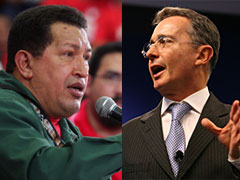Trouble on the Colombia-Venezuela Border
By Eliot Brockner for ISN
As rumors of an unlikely war between Colombia and Venezuela continue to circulate, the casualties of a smaller war at the border are already mounting up.
During the week of 3-10 June, at least 11 people died in drug-related violence in the Colombian city of Cúcuta and the surrounding area, including the violent deaths of at least six people in Ureña, just over the border in Venezuela.
The bloody week brings the number of violent deaths in Cúcuta in 2010 to 118, according to La Opinion, a Cúcuta-based daily. In 2009, Cúcuta had a homicide rate of 61.9 murders per 100,000 habitants, external pageaccording to a reportcall_made published by Medicina Legal, a Bogotá-based forensic science research facility. Although lower than the homicide rate in Cali or Medellin, it is still 36 percent higher than Colombia’s national average of 39.39 per 100,000 inhabitants.
The department of Norte de Santander, of which Cúcuta is the capital, had an average of 49.74 homicides per 100,000 inhabitants. Arauca department, east of Norte de Santander along the Colombia-Venezuela border, and a corridor of drug trafficking and other illegal activity, had the highest homicide rate of all of Colombia’s 32 departments at 110.43 murders per 100,000 inhabitants.
Much of the Colombian-Venezuelan border has become a battlefield of rival drug gangs, paramilitary groups and their smaller successors, and members of Colombia’s leftist insurgency, FARC. The lines are constantly blurring, as former rivals are teaming up to control production and transportation of illicit narcotics. The changing alliances make up-to-date intelligence and information about the groups’ activity crucial in the fight to combat rising levels of insecurity on both sides of the border.
The data point to a shared security threat. And as the week of 3 June demonstrated, the violence is not contained within a singular border. However, given the animosity between Bogotá and Caracas, arriving at such a cooperative agreement poses a number of challenges.
The two nations have been mired in a political dogfight since the Colombian military’s March 2008 raid on Ecuadorian soil. The attack inflamed sensitivities over regional sovereignty and the neighboring nations’ role in harboring terrorist groups. Colombia has accused the Venezuelan government of being sympathetic to FARC, a terrorist group reviled by many in Colombia. In July 2009, Colombia’s secretive handling of a deal with the US to allow the use of up to seven military bases prompted Venezuelan President Hugo Chávez to recall his ambassador to Colombia.
The latest diplomatic tiff involves accusations against nearly 20 Colombian nationals accused of spying in Venezuela. The accusations prompted the Colombian government to issue a travel warning in April 2010 to its citizens. Each day, thousands of Colombians cross the border to work in Venezuela.
The sour diplomatic relations have hurt economic ties between the two countries. Bilateral trade has shrunk 37 percent, from a high of US $7.3 billion in 2008 to US $4.6 billion in 2009, according to data from Cavecol, a Caracas-based organization dedicated to promoting binational trade between Colombia and Venezuela. Although the Colombian government insists much of this trade has been made up in other markets, notably China, the hundreds of thousands of people who make their living at the border may still be feeling the impact.
Retribution, not dialogue, has characterized the recent Venezuela-Colombia relationship. Both candidates in Colombia’s 20 June runoff vote have vowed to attempt to change this. Although it is not clear whether Chávez will be receptive to any overtures, battling a cross-border criminal problem may be the common ground the two nations need to negotiate their differences.

